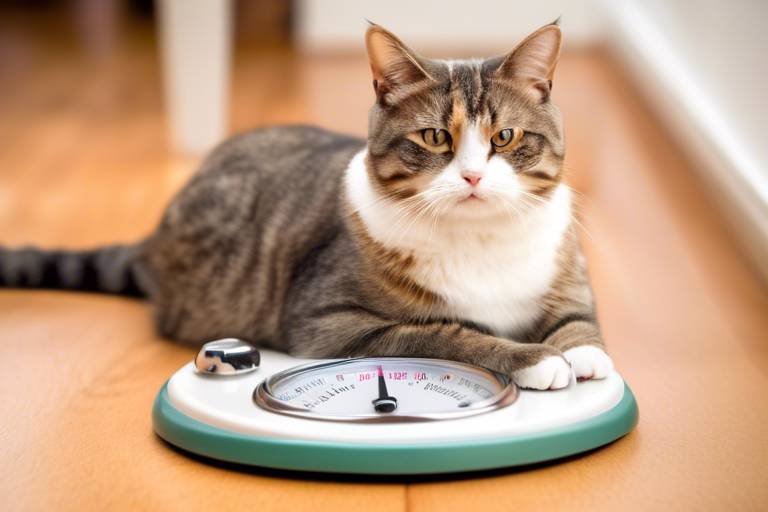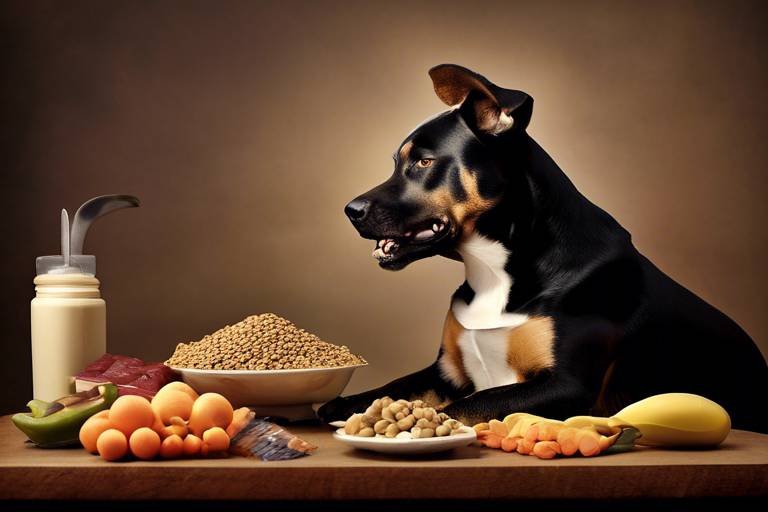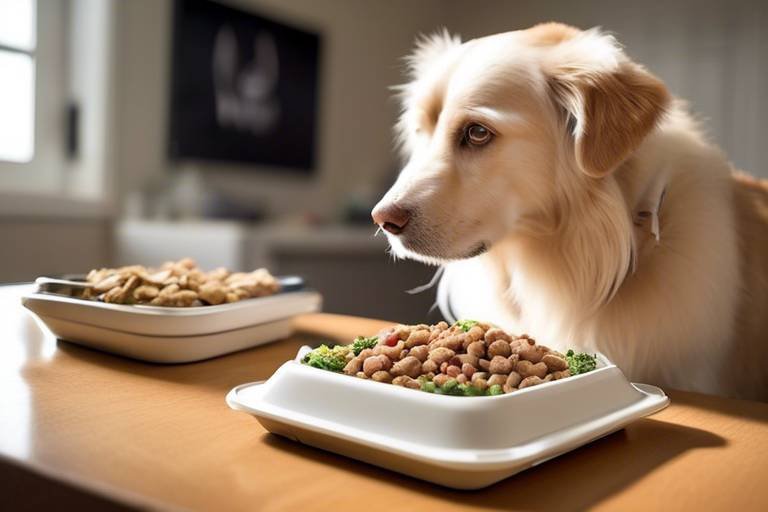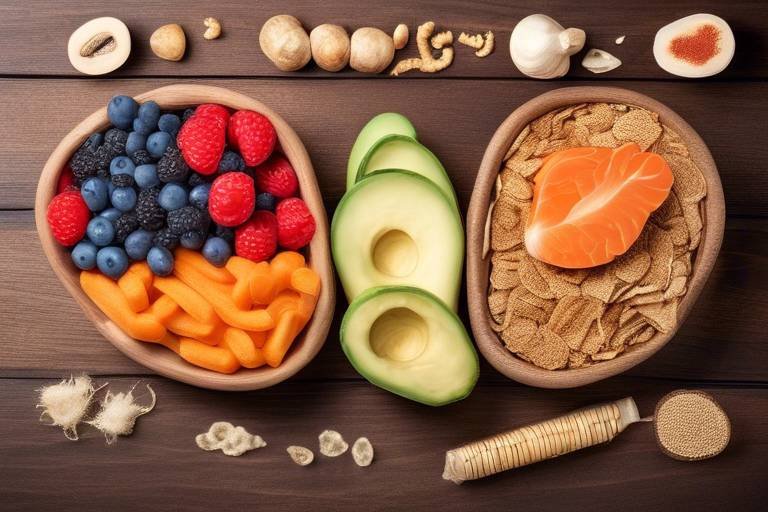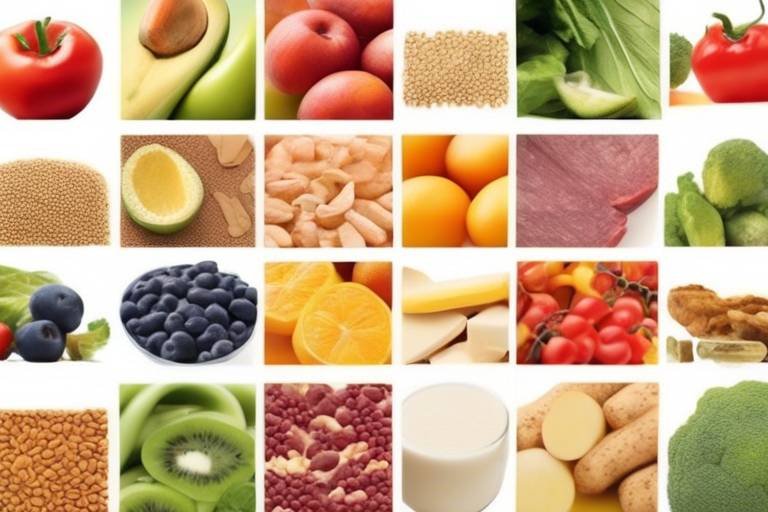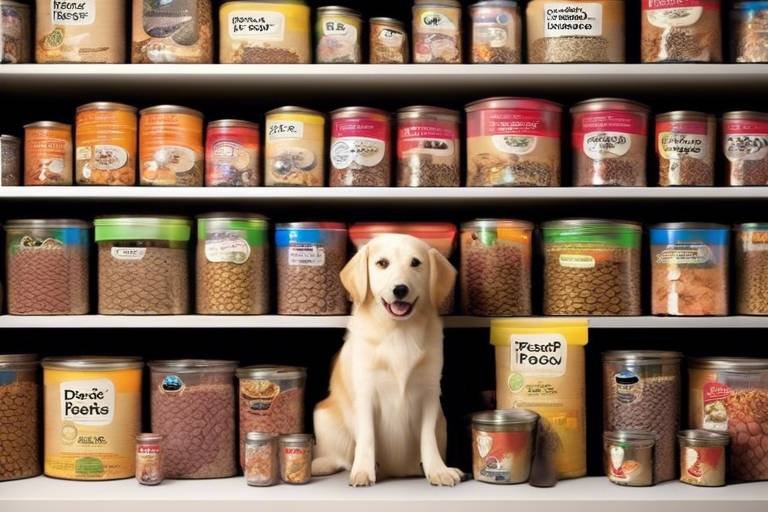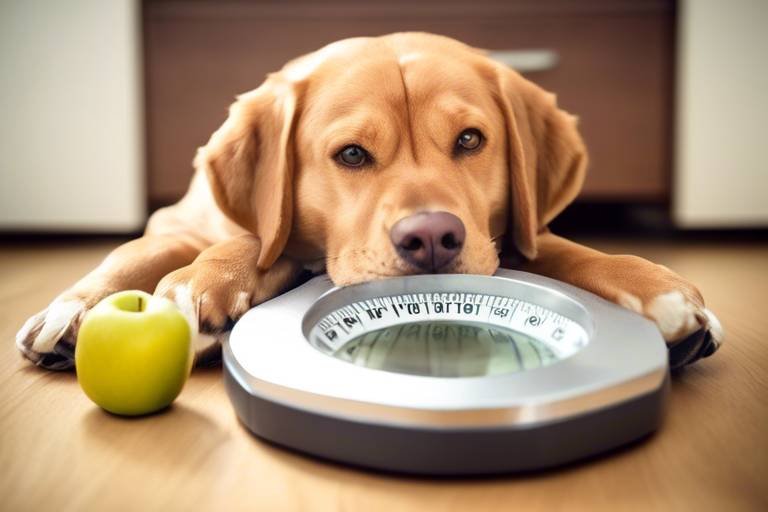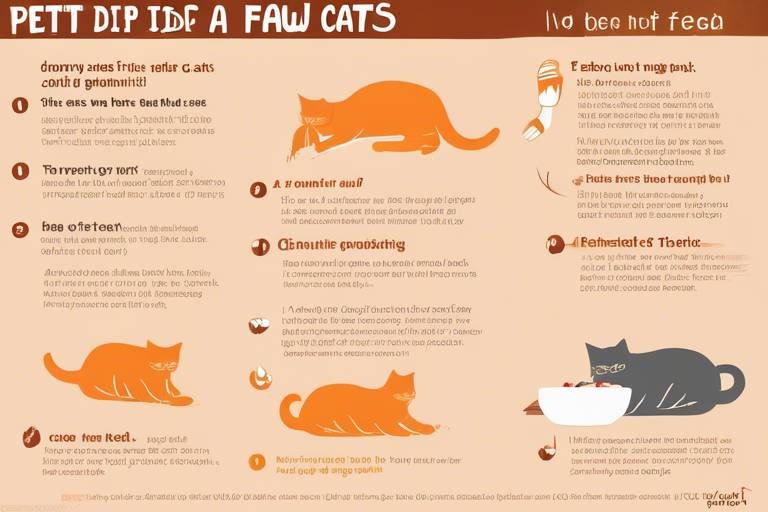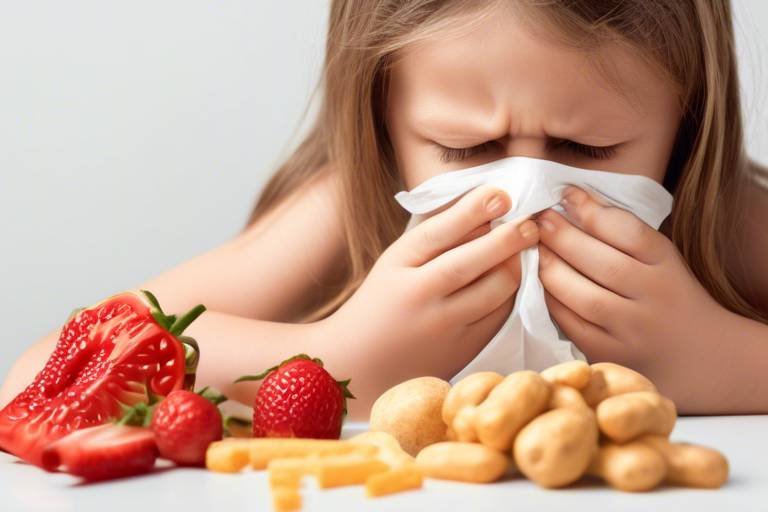How to Address Nutritional Imbalances in Pets
When it comes to our beloved furry companions, ensuring they receive a balanced diet is crucial for their overall health and well-being. Just like us, pets require a variety of nutrients to thrive, and any imbalance can lead to serious health issues. But what does it mean to have a nutritional imbalance? It's not just about feeding them the right amount of food; it’s about providing the right kind of food that meets their specific dietary needs. In this article, we'll dive deep into the world of pet nutrition, explore common imbalances, and discuss effective strategies to ensure your pets are getting everything they need to stay happy and healthy.
Nutritional imbalances in pets can manifest in various ways, and understanding these imbalances is the first step toward addressing them. Pets can suffer from both deficiencies and excesses of nutrients. A deficiency occurs when a pet does not receive enough of a particular nutrient, while an excess occurs when they get too much of something. Each scenario can lead to a host of health problems. For instance, a deficiency in essential fatty acids can lead to dry skin and poor coat quality, whereas an excess of certain vitamins can result in toxicity and organ damage. Recognizing these signs early can make a significant difference in your pet’s health.
Some nutrients are absolutely essential for your pet's health, and their absence can lead to serious issues. Common deficiencies include:
- Protein: A lack of protein can lead to muscle wasting and a weakened immune system.
- Vitamins: Vitamins like A, D, E, and K are crucial for various bodily functions. A deficiency can lead to vision problems, poor bone health, and impaired blood clotting.
- Minerals: Calcium and phosphorus are vital for bone health. Insufficient intake can lead to skeletal deformities.
Each of these deficiencies can manifest in noticeable symptoms. For example, if your pet is lethargic and has a dull coat, it might be time to reassess their nutrient intake. Ignoring these signs can lead to long-term health consequences, making early intervention essential.
Vitamins and minerals play crucial roles in your pet’s health. They are involved in metabolic processes, immune function, and overall vitality. Unfortunately, many commercial pet foods do not provide adequate amounts of these essential nutrients, leading to deficiencies. For instance, vitamin A is vital for vision and skin health, while vitamin D helps with calcium absorption. If your pet's diet lacks these vitamins, it could have serious implications for their health.
Recognizing the signs of vitamin deficiency is essential for early intervention. Some common symptoms include:
- Weight loss: Unexplained weight loss can be a sign of nutrient deficiency.
- Skin issues: Dry, flaky skin or excessive itching may indicate a lack of essential fatty acids or vitamins.
- Behavioral changes: Increased irritability or lethargy can also hint at nutritional imbalances.
If you notice any of these symptoms in your pet, it’s crucial to consult with a veterinarian to determine the best course of action.
When deficiencies are identified, supplementation may be necessary. But how do you do it safely and effectively? There are various options for supplementing vitamins and minerals in your pet's diet:
- Commercial supplements: These are widely available and can be a convenient option for pet owners.
- Whole food sources: Adding foods rich in specific nutrients can also help. For instance, carrots are high in vitamin A, while fish oil can provide essential fatty acids.
- Veterinarian-recommended products: Always consult your vet before introducing any supplements to ensure they are appropriate for your pet's specific needs.
While deficiencies are concerning, excess nutrients can also pose risks. Over-supplementation can lead to toxicity, particularly with fat-soluble vitamins like A, D, E, and K. For example, too much vitamin A can lead to bone pain and liver damage. It’s essential to maintain a balanced nutrient intake to avoid these risks. Always follow the recommended dosages and consult with a veterinarian if you are unsure.
Regular assessment of your pet's diet is crucial for maintaining nutritional balance. Start by evaluating the ingredients in their food. Look for high-quality protein sources, appropriate fat levels, and a good mix of vitamins and minerals. You should also consider your pet's specific needs based on their age, breed, and health status. Keeping a food diary can be helpful in identifying patterns and potential deficiencies.
Veterinarians can offer valuable insights into your pet's dietary needs. They can help you identify nutritional imbalances and recommend appropriate dietary changes or supplements tailored to your pet's specific health requirements. Regular check-ups are essential, as they can help catch any issues before they become serious.
Choosing between homemade and commercial diets can be challenging. Homemade diets allow for more control over ingredients and can be tailored to your pet's specific needs. However, they require careful planning to ensure they are nutritionally complete. On the other hand, commercial diets are convenient and often formulated to meet the nutritional standards set by veterinary organizations. Weighing the pros and cons of each option can help you make informed decisions for your pet's nutrition.
1. How can I tell if my pet has a nutritional imbalance?
Look for signs such as lethargy, weight loss, skin problems, or changes in behavior. If you notice any of these, consult your veterinarian.
2. Is it safe to give my pet supplements?
While some supplements can be beneficial, it's essential to consult with your veterinarian to determine the correct type and dosage for your pet.
3. Can I switch my pet's diet suddenly?
It's best to transition to a new diet gradually over a week or so to avoid digestive upset.
4. Are homemade diets better than commercial ones?
Both have their pros and cons. Homemade diets allow for customization, but they require careful nutrient balance, while commercial diets are convenient and formulated to meet nutritional standards.

Understanding Nutritional Imbalances
Nutritional imbalances in pets can be a silent but significant threat to their overall health. Just like humans, our furry friends require a well-rounded diet to thrive, and when they don’t get the right nutrients, it can lead to various health issues. Imagine trying to drive a car with a flat tire; it might still move, but it won’t perform at its best. Similarly, pets with nutritional imbalances may appear fine on the surface, but underneath, they might be struggling. Nutritional imbalances can manifest as either deficiencies or excesses, and both can have serious implications for your pet’s well-being.
Deficiencies occur when a pet’s diet lacks essential nutrients, such as vitamins, minerals, or proteins. For instance, a dog that doesn’t get enough calcium may develop weak bones, while a cat lacking taurine could face heart issues. On the flip side, excesses happen when pets consume too much of a particular nutrient, which can be just as harmful. Think of it this way: too much of a good thing can quickly turn bad. Over-supplementation of vitamins can lead to toxicity, causing everything from kidney damage to gastrointestinal problems.
It’s crucial for pet owners to recognize the signs of these imbalances. Symptoms might include lethargy, poor coat condition, weight changes, or even behavioral issues. The key is to be proactive rather than reactive. Regularly assessing your pet’s diet and monitoring their health can help catch these issues before they escalate. But how do you know what’s right for your pet? That’s where understanding the common nutritional needs of pets comes into play.
To better illustrate the types of nutritional imbalances, consider the following table:
| Type of Imbalance | Examples | Potential Effects |
|---|---|---|
| Deficiency | Vitamin A, Calcium, Taurine | Poor vision, bone weakness, heart disease |
| Excess | Vitamin D, Iron, Protein | Kidney damage, gastrointestinal distress, obesity |
Understanding these imbalances is the first step in ensuring that your pet receives a balanced diet. It’s not just about what they eat; it’s about how their bodies respond to those nutrients. Every pet is unique, and their dietary needs can vary based on factors like age, breed, and health conditions. So, as a responsible pet owner, it’s essential to stay informed and, when in doubt, consult your veterinarian. After all, you wouldn’t want to put your beloved companion at risk, would you?

Common Nutritional Deficiencies
Nutritional deficiencies in pets can lead to a myriad of health issues, often sneaking up on pet owners who might not realize their furry friends are lacking essential nutrients. Just like humans, pets require a well-rounded diet to maintain their health, energy levels, and overall well-being. A deficiency can manifest in various ways, from lethargy to more severe health complications. It's crucial to understand which nutrients are commonly deficient in pet diets and how to recognize the signs before they escalate into more significant problems.
One of the most prevalent deficiencies in pets is protein deficiency. Proteins are the building blocks of life, essential for growth, repair, and maintenance of body tissues. Without adequate protein, pets may experience muscle wasting, weakened immune function, and even behavioral changes. Additionally, fatty acids, particularly omega-3 and omega-6, are vital for skin and coat health. A lack of these can lead to dry, flaky skin and an unkempt appearance. In fact, many pet owners may notice that their pets are scratching more than usual or have a dull coat, which can often be traced back to insufficient fatty acid intake.
Another critical area of concern is vitamins and minerals. Pets, especially dogs and cats, require a range of vitamins for various bodily functions. For instance, a deficiency in Vitamin A can lead to vision problems and a weakened immune system, while a lack of Vitamin D can affect calcium absorption, leading to bone issues. Minerals such as calcium and phosphorus are also crucial for bone health, and deficiencies can result in skeletal problems, particularly in growing puppies and kittens. The following table highlights some common nutritional deficiencies in pets and their potential symptoms:
| Nutrient | Common Symptoms | Potential Long-term Effects |
|---|---|---|
| Protein | Muscle wasting, lethargy | Weakened immune system, organ failure |
| Fatty Acids | Dry skin, dull coat | Skin infections, allergies |
| Vitamin A | Poor vision, immune issues | Blindness, increased susceptibility to infections |
| Vitamin D | Bone pain, weakness | Osteoporosis, fractures |
| Calcium | Weak bones, dental issues | Bone deformities, growth retardation |
Recognizing these deficiencies early on is crucial to preventing long-term health issues. If you notice any troubling symptoms in your pet, it’s worth investigating their diet. Remember, just like a car needs the right fuel to run smoothly, your pet needs a balanced diet to thrive. Regularly checking the ingredients of your pet's food and ensuring it meets their nutritional needs can make all the difference.
In conclusion, the key to a healthy, happy pet lies in their diet. By being aware of common nutritional deficiencies and their symptoms, pet owners can take proactive steps to ensure their furry companions receive the nutrients they need. If you're ever in doubt, consulting with a veterinarian can provide tailored advice to keep your pet in tip-top shape.
- What are the signs that my pet might have a nutritional deficiency? Look for symptoms like lethargy, poor coat condition, skin issues, and behavioral changes.
- How can I ensure my pet's diet is balanced? Regularly consult with your veterinarian and choose high-quality pet food that meets AAFCO standards.
- Are homemade diets better for pets? They can be, but it’s essential to ensure they are nutritionally complete and balanced. Always consult a vet before switching your pet's diet.
Vitamins and Minerals
When it comes to your pet’s health, are the unsung heroes that often go unnoticed. Just like humans, our furry companions require a balanced intake of these essential nutrients to thrive. Vitamins are organic compounds that help regulate various bodily functions, while minerals are inorganic elements that play a crucial role in everything from bone health to nerve function. The right balance is vital; too little can lead to deficiencies, while too much can cause toxicity. So, how do you ensure your pet is getting the vitamins and minerals they need?
First, let’s delve into the specific vitamins and minerals that are commonly lacking in pet diets. For instance, Vitamin A is essential for vision, immune function, and skin health. A deficiency in this vitamin can lead to night blindness and skin issues. On the mineral side, calcium is crucial for bone development and maintenance. Insufficient calcium can lead to serious skeletal problems, especially in growing puppies and kittens. Other important nutrients include:
- Vitamin D: Essential for calcium absorption.
- Vitamin E: Acts as an antioxidant and supports immune function.
- Iron: Vital for red blood cell production.
- Zinc: Important for skin health and immune function.
It's important to remember that not all pet foods are created equal. Some commercial diets may lack these vital nutrients, especially if they contain low-quality ingredients. Homemade diets can also pose risks if they are not formulated correctly. Thus, understanding what your pet’s specific needs are based on their age, breed, and health condition is crucial.
Now, if you notice any signs of vitamin or mineral deficiency in your pet, it’s essential to act quickly. Symptoms can range from lethargy and poor coat condition to more severe health issues. Regular veterinary check-ups can help identify any potential deficiencies before they become serious problems. Your vet can provide recommendations tailored to your pet's unique dietary needs, ensuring they receive the right balance of vitamins and minerals.
In conclusion, maintaining an optimal level of vitamins and minerals in your pet's diet is not just a good idea—it's a necessity. By staying informed and proactive about your pet's nutritional needs, you can help ensure they live a long, healthy, and vibrant life.
Q: How can I tell if my pet is getting enough vitamins and minerals?
A: Look for signs of energy, a shiny coat, and overall good health. Regular vet check-ups can also help identify any deficiencies.
Q: Are there specific foods that are high in essential vitamins and minerals for pets?
A: Yes! Foods like leafy greens, carrots, and certain fish are great sources of vitamins. Always consult your vet for the best options for your pet.
Q: Can I give my pet human vitamins?
A: It's not advisable to give human vitamins to pets without veterinary guidance, as some human vitamins can be toxic to animals.
Signs of Vitamin Deficiency
Recognizing the signs of vitamin deficiency in your pet is crucial for early intervention. Just like us, pets rely on a balanced intake of vitamins to support their overall health. When they don’t get enough of these essential nutrients, their bodies can start to show alarming signs. Imagine your furry friend suddenly lacking the energy they once had, or perhaps their coat loses its shine—these could be red flags indicating a nutritional imbalance.
Some common symptoms of vitamin deficiency include:
- Fatigue and Lethargy: If your pet seems unusually tired or disinterested in playtime, it might be due to a lack of essential vitamins.
- Skin Issues: Dry, flaky skin or excessive itching can signal a deficiency in vitamins like A, E, or essential fatty acids.
- Digestive Problems: Diarrhea or constipation may arise from inadequate vitamin intake, particularly B vitamins.
- Weak Immune System: Frequent infections or illnesses can indicate a lack of vitamins that support immune function, such as C and D.
- Behavioral Changes: Increased irritability or anxiety can be linked to deficiencies in certain B vitamins.
These symptoms are just the tip of the iceberg. For instance, a lack of Vitamin A can lead to vision problems, while insufficient Vitamin D can cause bone issues. It's essential to pay attention to these signs, as they can lead to more severe health concerns if left unaddressed. If you notice any of these symptoms in your pet, it’s wise to consult your veterinarian for a thorough examination and dietary assessment.
In some cases, you might also want to consider keeping a diet diary for your pet. Documenting what they eat can help you and your vet pinpoint any potential deficiencies. It’s like putting together a puzzle—each piece of information can lead to a clearer picture of your pet's nutritional health.
Ultimately, being proactive about your pet’s diet can make a world of difference. Just like we take our vitamins to feel our best, ensuring our pets receive the right nutrients is vital for their happiness and longevity.
Supplementing Missing Nutrients
When it comes to ensuring your pet's health, can be a game changer. Imagine your pet as a finely tuned machine; without the right fuel, it won't run efficiently. Nutritional deficiencies can lead to a host of health issues, and sometimes, even the best commercial diets may not provide all the essential nutrients your furry friend needs. So, how do you go about supplementing their diet safely and effectively?
First off, it's crucial to identify which nutrients are lacking. This can be done through a combination of observing your pet's behavior, physical condition, and, ideally, consulting with your veterinarian. They can help you understand which specific vitamins or minerals your pet might be deficient in and recommend appropriate supplements. For instance, if your pet is lacking in Omega-3 fatty acids, you might consider adding fish oil to their meals. This supplement is known for promoting a healthy coat and skin, not to mention its anti-inflammatory properties that can benefit joints.
There are various ways to supplement your pet's diet. Here are some common options:
- Commercial Supplements: These come in various forms, such as tablets, powders, or liquids. They are specifically formulated to provide the necessary nutrients in a controlled dosage.
- Whole Foods: Adding whole foods like fruits and vegetables can also be beneficial. For example, carrots are great for vision, while blueberries are packed with antioxidants.
- Homemade Supplements: Some pet owners opt to make their own supplements, but caution is advised. It's essential to ensure that these homemade options are nutritionally balanced and safe for your pet.
However, while supplementation can be beneficial, it's important to remember that more isn’t always better. Over-supplementing can lead to toxicity and other health issues. For example, while Vitamin A is essential for your pet's health, excessive amounts can lead to serious complications. Therefore, always follow the recommended dosages and consult your veterinarian before introducing any new supplements into your pet's diet.
In summary, supplementing missing nutrients can significantly enhance your pet's overall health and well-being. By identifying deficiencies, choosing the right supplements, and adhering to recommended dosages, you can help your furry friend thrive. Remember, a well-nourished pet is a happy pet!
Q: How do I know if my pet needs supplements?
A: Look for signs of nutritional deficiencies such as poor coat condition, lethargy, or changes in appetite. Consulting your veterinarian is the best way to get a tailored assessment.
Q: Can I give my pet human supplements?
A: Some human supplements can be harmful to pets. Always consult your veterinarian before giving any human supplements to your pets.
Q: How long does it take to see improvements after starting supplements?
A: This can vary based on the nutrient and the individual pet. Some improvements may be noticeable within a few weeks, while others may take longer. Regular check-ups with your veterinarian can help monitor progress.
Excess Nutrients: Risks and Concerns
When we think about our pets' nutrition, it’s easy to focus solely on the deficiencies. However, the other side of the coin—excess nutrients—can be just as dangerous. Imagine filling a car with fuel, but instead of stopping at the tank's capacity, you keep pouring. Eventually, it spills over, causing a mess and potentially damaging the engine. Similarly, over-supplementing your pet's diet can lead to serious health issues.
It's crucial to understand that while nutrients are essential for health, too much of a good thing can become harmful. For instance, excessive amounts of certain vitamins, such as A and D, can lead to toxicity. This can cause symptoms ranging from mild discomfort to severe health complications. Pets may experience symptoms like vomiting, diarrhea, or lethargy, which can be alarming for any pet owner.
In addition to vitamins, minerals can also pose risks when consumed in excess. For example, too much calcium can lead to kidney issues, while an overload of phosphorus can disrupt the balance of other vital nutrients. This disruption can create a cascade of health problems, making it imperative to monitor your pet's nutrient intake closely. To help clarify this, take a look at the table below:
| Nutrient | Risks of Excess | Symptoms |
|---|---|---|
| Vitamin A | Toxicity, liver damage | Vomiting, weight loss, lethargy |
| Vitamin D | Kidney damage, calcification of organs | Loss of appetite, increased thirst, urination |
| Calcium | Kidney stones, impaired absorption of other minerals | Weakness, vomiting, constipation |
| Phosphorus | Bone issues, kidney damage | Bone pain, lethargy, loss of appetite |
As you can see, the risks associated with excess nutrients can be quite serious. It’s important to strike a balance in your pet’s diet, ensuring that they receive the right amounts of each nutrient without going overboard. This is where regular consultation with a veterinarian becomes invaluable. They can provide tailored advice, helping you navigate the tricky waters of pet nutrition.
In conclusion, while we often emphasize the need to address deficiencies in our pets' diets, we must also be vigilant about the potential for over-supplementation. Just as a balanced diet is critical for our health, it is equally essential for our furry friends. So, the next time you consider adding supplements to your pet’s meals, remember: less is often more when it comes to nutrients, and moderation is key to a happy, healthy pet.
- What are the signs of nutrient excess in pets? Look for symptoms like vomiting, lethargy, or unusual behavior. If you notice any of these, consult your veterinarian.
- Can I give my pet human vitamins? It's not advisable unless specifically recommended by a veterinarian, as human vitamins can contain levels that are too high for pets.
- How can I ensure my pet's diet is balanced? Regularly consult with your vet, and consider using high-quality commercial pet food that meets AAFCO standards.
- Are homemade diets better for pets? They can be, but they require careful planning to ensure they meet all nutritional needs. Always consult with a vet before switching.

Assessing Your Pet's Diet
When it comes to our beloved furry friends, ensuring they have a balanced diet is akin to finding the perfect recipe for a gourmet meal. Just like we wouldn't want to eat the same bland dish every day, our pets deserve a varied and nutritious diet that meets their unique needs. Assessing your pet's diet isn't just a one-time task; it's an ongoing process that requires attention and care. So, how do you go about it? Let's dive into some effective strategies for evaluating your pet's nutritional intake.
First and foremost, keeping a food diary can be an invaluable tool. By jotting down what your pet eats daily, including treats, you can get a clearer picture of their nutritional habits. This diary will help you identify patterns, such as whether they are getting enough protein, fiber, or other essential nutrients. It can also highlight any potential overindulgence in treats that could lead to weight gain. Remember, a well-rounded diet is crucial for maintaining your pet’s energy levels and overall health!
Next, consider the quality of the food you are providing. Not all pet foods are created equal! Look for high-quality ingredients that are rich in nutrients. A quick glance at the label can reveal a lot. Ingredients should be listed in descending order, meaning the first few should be high-quality sources of protein, followed by wholesome grains and vegetables. If the first ingredient is a vague term like "meat by-products," it might be time to rethink your choice. You want your pet to thrive, not just survive!
Moreover, consulting a veterinarian can provide significant insights into your pet's dietary needs. They can help you analyze your pet's current diet and determine if it meets their specific health requirements based on their age, breed, and activity level. A vet can also assist in identifying any potential deficiencies or excesses that may not be immediately apparent. Think of them as your pet's personal nutritionist, guiding you toward the best choices for your furry companion.
Lastly, it's essential to stay informed about the latest nutritional research and trends in pet food. The pet nutrition landscape is always evolving, and what was considered optimal a few years ago may no longer hold true. Engaging with reputable sources, reading up-to-date articles, and participating in pet owner forums can help you stay ahead of the curve. Remember, a well-informed pet owner is an empowered pet owner!
- How often should I assess my pet's diet? It's advisable to review your pet's diet every few months or whenever you notice changes in their health or activity levels.
- What signs indicate that my pet's diet needs to be changed? Look for signs like weight gain or loss, changes in coat quality, lethargy, or gastrointestinal issues.
- Can I switch my pet's food suddenly? It's best to transition gradually over a week to avoid digestive upset. Mix the new food with the old food, increasing the new food's proportion each day.
Consulting a Veterinarian
When it comes to your pet's health, is one of the best decisions you can make. Just like we rely on doctors for our health issues, your furry friends deserve the same expert care. A veterinarian is not just a medical professional; they are a wealth of knowledge about animal nutrition, health, and behavior. They can help you navigate the complex world of pet diets, ensuring your companion gets all the essential nutrients they need to thrive.
One of the primary roles of a veterinarian is to assess your pet's specific dietary needs. This is particularly important if you notice any changes in their behavior or health. Have they been lethargic? Is their coat looking dull? These could be signs of nutritional imbalances that a vet can help identify. During a consultation, a veterinarian can conduct a thorough examination and may suggest a variety of tests to evaluate your pet's overall health and nutritional status.
Moreover, a veterinarian can provide tailored dietary recommendations based on your pet's age, breed, weight, and any existing health conditions. For instance, a growing puppy has different nutritional requirements compared to a senior dog. A vet can help you understand the specific nutrients your pet needs and recommend appropriate food options, whether they are commercial brands or homemade recipes.
It's also important to discuss any supplements you might be considering. While some supplements can be beneficial, others may pose risks if not administered correctly. A veterinarian can advise you on safe and effective supplementation, ensuring your pet receives the right amounts without exceeding recommended limits. This is crucial because over-supplementation can lead to toxicity or other health issues.
In addition to dietary advice, a vet can help you create a well-rounded health plan that includes regular check-ups, vaccinations, and preventive care. This holistic approach not only focuses on nutrition but also on overall wellness, ensuring your pet leads a long and healthy life.
In summary, consulting a veterinarian is an essential step in addressing your pet's nutritional needs. They are equipped with the expertise to guide you through the maze of pet nutrition, helping you make informed decisions that benefit your furry friend. So, don’t hesitate to reach out to your local vet; your pet will thank you for it!
- How often should I consult a veterinarian about my pet's diet? It’s advisable to consult your vet at least once a year, or more frequently if you notice changes in your pet's health or behavior.
- Can I switch my pet's diet without consulting a vet? While you can make changes, it’s always best to consult a vet to ensure the new diet meets your pet's nutritional needs.
- What signs indicate my pet may have a nutritional imbalance? Common signs include weight loss or gain, poor coat condition, low energy levels, and digestive issues.
Homemade vs. Commercial Diets
When it comes to feeding our furry friends, the age-old debate of homemade diets versus commercial diets often comes into play. Each option has its own set of advantages and disadvantages, making it crucial for pet owners to weigh their choices carefully. Imagine you're at a buffet, with dishes that are either meticulously prepared by a chef or pre-packaged meals. Which would you choose for your beloved pet? Let’s dive deeper into this comparison.
On one hand, homemade diets allow you to have complete control over the ingredients. You can customize meals to suit your pet’s specific health needs, preferences, and allergies. This is particularly beneficial for pets with special dietary requirements. For example, if your dog is allergic to chicken, you can easily substitute it with turkey or beef. Moreover, by preparing meals at home, you can ensure that everything is fresh and free from preservatives, which is a significant concern with many commercial products.
However, crafting a balanced homemade diet is no small feat. It requires a solid understanding of your pet's nutritional needs, which can vary widely depending on their age, breed, and health status. If you're not careful, you might end up with a diet that lacks essential nutrients. For instance, if a homemade diet is predominantly meat-based, it may lack the necessary vitamins and minerals that come from grains and vegetables. This is where professional guidance becomes invaluable.
On the flip side, commercial diets are designed to meet the nutritional requirements of pets, often backed by extensive research and development. They come in various forms, including dry kibble, wet food, and even freeze-dried options. These products are typically formulated to provide a complete and balanced diet, making them convenient for pet owners who may not have the time or expertise to prepare homemade meals. Additionally, commercial diets often undergo rigorous testing to ensure safety and quality, which can give pet owners peace of mind.
Yet, not all commercial diets are created equal. Some brands prioritize profits over quality, using fillers and artificial additives that can be detrimental to your pet’s health. As a pet owner, it’s essential to read labels carefully and choose high-quality products that list real meat as the first ingredient and avoid unnecessary fillers like corn and soy.
To help you make an informed choice, here’s a quick comparison table:
| Aspect | Homemade Diets | Commercial Diets |
|---|---|---|
| Control over Ingredients | High | Variable |
| Convenience | Time-consuming | Quick and easy |
| Cost | Potentially higher | Variable, often lower |
| Nutritional Balance | Risk of imbalance | Generally balanced |
| Quality Control | Dependent on the owner | Depends on the brand |
Ultimately, the decision between homemade and commercial diets should be based on your pet's unique needs, your lifestyle, and your ability to commit to preparing balanced meals. Consulting with a veterinarian can provide valuable insights tailored to your pet's specific requirements, ensuring that whatever choice you make supports their health and happiness.
- Can I mix homemade and commercial diets? Yes, many pet owners choose to do this to take advantage of the benefits of both. Just ensure that the overall diet remains balanced.
- How do I know if my homemade diet is balanced? Consulting with a veterinarian or a pet nutritionist can help you create a balanced meal plan tailored to your pet’s needs.
- Are commercial diets safe for all pets? While most commercial diets are formulated to be safe, always check for quality and consult with your vet, especially if your pet has specific health concerns.
Frequently Asked Questions
- What are the signs of nutritional imbalances in pets?
Nutritional imbalances can show up in various ways. Look out for symptoms like lethargy, poor coat condition, weight changes, digestive issues, and behavioral changes. If your pet seems off, it might be time to evaluate their diet!
- How can I tell if my pet has a vitamin deficiency?
Common signs of vitamin deficiency include dull fur, skin problems, poor appetite, and lethargy. For example, a lack of Vitamin A can lead to vision issues, while a deficiency in Vitamin D can affect bone health. Always keep an eye on your furry friend!
- Is it safe to supplement my pet's diet?
Yes, but it’s crucial to do it safely! Over-supplementation can lead to toxicity and other health issues. Always consult your veterinarian before adding any supplements to ensure they’re appropriate for your pet’s specific needs.
- What are the risks of feeding my pet too many nutrients?
Just like deficiencies, excess nutrients can be harmful! For instance, too much calcium can lead to skeletal issues, while an overload of Vitamin A can cause serious health problems. Balance is key in pet nutrition!
- How often should I assess my pet's diet?
Regular assessments are essential! Aim to review your pet's diet every few months or whenever you notice changes in their health or behavior. This proactive approach can help catch any imbalances early.
- Should I consult a veterinarian about my pet's diet?
Absolutely! A veterinarian can provide tailored advice based on your pet's specific health needs, lifestyle, and dietary requirements. Their expertise can help you create a balanced diet that keeps your furry friend thriving.
- What are the pros and cons of homemade vs. commercial diets?
Homemade diets allow for full control over ingredients, but they can be challenging to balance properly. Commercial diets are convenient and often formulated to meet nutritional needs, but they may contain fillers. Weigh the benefits and drawbacks to make the best choice for your pet!




